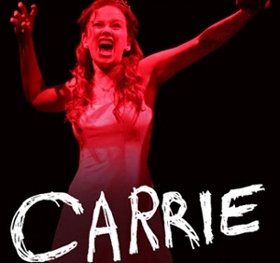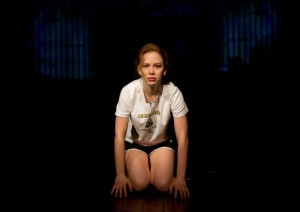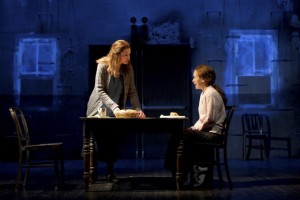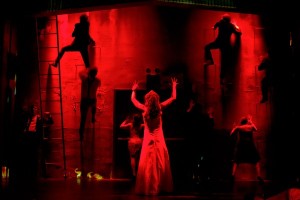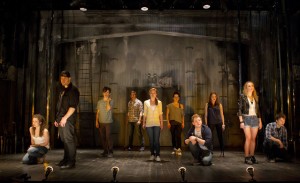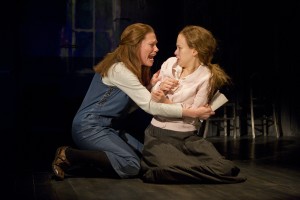MCC GETS CARRIE-D AWAY
The myth that youth market musicals are a low-risk venture has gained strength over the last few years in New York City. Short-sighted producers will overlook disasters such as Glory Days in favor of mounting the next potential Spring Awakening. This phenomenon has never more clearly been on display than in Manhattan Class Company’s (MCC) current revival of the great musical flop, Carrie.
The biggest problem with any attempt to musicalize Carrie, the iconographic Brian De Palma movie based on the iconic Stephen King novel, is that neither source begs to be musicalized. In fact, the Carrie narrative contains none of the tropes associated with successful musicals: exotic locations, the magic of once upon a time, and the obligatory love story. Even more curious is how book-writer Lawrence D. Cohen managed to give the show’s point of view to Carrie’s classmate, Sue Snell, and in turn, write a musical called Carrie that’s not really about Carrie White.
I’m getting ahead of myself. Carrie is about a high school girl raised by an abusive religious zealot of a mother. After Carrie is bullied and humiliated at school by just about everyone except for a few sensitive souls, her telekinetic powers emerge, and she gets revenge. Even if you’re Sondheim, this is tricky material to make into a musical. The collaborative team of Michael Gore (music), Dean Pitchford (Lyrics), and Cohen simply could not crack this nut. The songs are competent, but bland. The language of youth and rage may occasionally shine through in the lyrics, but the dark language is so contained that it feels completely out of place. The point of youth market musicals is to explore the depth of despair at the heart of the existential panic known as becoming an adult. If anyone has earned the right to sing about “The Bitch of Living,” how “We’re Totally Fucked!” and living on the “Boulevard of Broken Dreams,” it is Carrie White. For Carrie the musical to work, it needs a dark, sharp edge.
The principal casting is ill-chosen in the MCC production. The remarkable Marin Mazzie seems wrong for the role of Carrie’s mother. She comes off as a little too well put together, more a Michele Bachmann on a bad hair day than the Piper Laurie nightmare mother. Part of the problem is the music. Most of Mazzie’s songs have an inappropriate pop beat that feels closer to a Disney Oscar winning song than a cousin to Sweeney Todd. And while it is a pleasure to hear Marin Mazzie sing just about anything, you can’t get around her miscasting. Molly Ranson as Carrie hits her stride at the Prom, but her Carrie is so underdeveloped in the libretto that she comes across as an irritating Lisa Lubner loser. Like Mazzie, her vocal stylings are impeccable. However, since Cohen tells Carrie’s story from Sue Snell’s point of view, Ranson’s Carrie is lucky to get the stage time that she does.
There are no real stand-outs in the cast. Cohn gives us the standard high school archetypes and nothing more. The show’s best moments come from former American Idol contestant Derek Kena as Tommy Ross, the sensitive jock/poet who bonds with Carrie over his delicate English class composition and ends up taking her to the prom. Even though we have seen this character many, many times before, Kena has a decent pop singing voice well suited for his sensitive ballad. Jeanna De Waal’s bad girl Chris and Christy Altomare’s compassionate Sue are so poorly directed that any conflict they might have tried to generate is left unrealized. Stafford Arima’s direction is extremely unfocused; the whole evening feels ill-conceived. Equally awful is Matt Williams’ second-rate choreography. I couldn’t tell if the ensemble looked embarrassed or just plain bored.
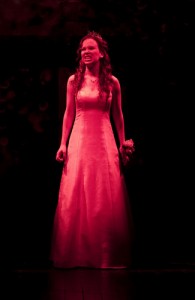 To compound matters, Mary-Mitchell Carpenter’s musical direction lacks muscle. The singers are all capable, but they are never asked to do anything remotely memorable. On the whole, the music has a very synthetic sound. For a story that should err on the side of Grand Guignol, Carpenter’s orchestrations evoke a sound more akin to High School Musical.
To compound matters, Mary-Mitchell Carpenter’s musical direction lacks muscle. The singers are all capable, but they are never asked to do anything remotely memorable. On the whole, the music has a very synthetic sound. For a story that should err on the side of Grand Guignol, Carpenter’s orchestrations evoke a sound more akin to High School Musical.
Part of the success of any production of Carrie lies in how spectacularly amazing the special effects are. The MCC production is a mixed bag. The limited Lucille Lortel Theatre stage would take a creative team with great ingenuity and imagination to pull it all off. Unfortunately, they’re only partially up to the task. When literal sparks fly as Carrie’s telekinesis first appears, it looks like a botched magic trick from a gag store when it should be a moment that reveals something to be feared. We can’t help but look for the strings as Carrie makes objects dangle in space or move across the stage. The MCC design team does hit their mark with the famous pig’s blood in a bucket at the prom climax. Opting for projections over actual messy liquid in a bucket, the effect is quite grand. For a minute the design team conjures an image of the production that-could-have-been. Sight and sound fill the stage, and we are all awash with blood and then burn with the fires of Carrie’s rage – until the next scene comes along, and we’re back in the smallness and disappointments of the MCC production.
Carrie was probably never meant to be a musical. Seriousness undermines almost every step of the way. The night I attended, the audience frequently giggled during the grimmest moments. If anyone ever revives Carrie again, they would be wise to avoid pitching it to the earnest youth market. Instead, they might be wise to cast it with drag queens who can draw on their telekinetic powers of high camp.
photos by Joan Marcus
Carrie
MCC Theater at the Lucille Lortel Theatre
ends on April 8, 2012
for tickets, visit MCC
